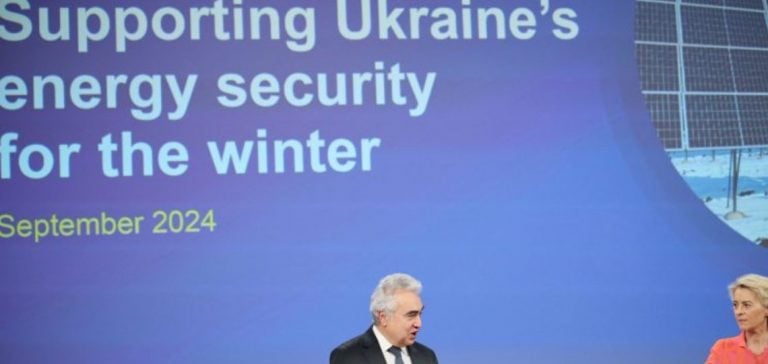Faced with what promises to be a critical winter for Ukraine, the European Union (EU) is stepping up its energy support.
The Ukrainian grid, heavily damaged by Russian strikes, is struggling to keep up with demand, leaving the threat of massive blackouts looming during the cold months.
According to the International Energy Agency (IEA), Ukraine has lost more than two-thirds of its electricity production capacity, a worrying situation as demand is set to rise with the onset of winter.
To address these shortcomings, the EU has announced a €160 million grant to improve Ukraine’s energy infrastructure.
This assistance, mainly dedicated to the installation of renewable energy sources such as solar panels, aims to strengthen the resilience of the Ukrainian energy network in the face of recurring Russian attacks.
This aid is in addition to the already substantial financial commitment made by the EU since the start of the conflict in February 2022.
Crucial aid for energy security
The stakes for Ukraine are high: without external support, the country risks facing massive power cuts, with dramatic repercussions for the population and the effectiveness of the military apparatus.
The destruction of energy infrastructure by Russian strikes is clearly aimed at weakening Ukrainian resistance by paralyzing its means of energy production and distribution.
EU aid, while important, will not be enough on its own to compensate for the losses.
Financial and logistical support will have to be accompanied by an internal reorganization of Ukrainian energy resources, with a focus on the security of critical infrastructures, now considered priority targets in this conflict.
Clearly, Ukraine’s dependence on international aid remains unavoidable to get through the winter.
Differences over the use of long-range weapons
While the energy issue is crucial, the debate surrounding military aid remains just as sensitive.
Ukraine is asking its Western allies for permission to use long-range weapons against Russian targets, and this divides EU member states and NATO members alike.
The European Parliament recently came out in favor of lifting restrictions on these weapons, prompting an immediate reaction from Moscow.
The Chairman of the State Duma, Vyacheslav Volodin, warned of a military escalation that could lead to direct reprisals against European countries.
For the time being, some countries like the UK are more open to this option, while other EU members prefer a more measured approach, fearing an uncontrollable spread of the conflict.
This debate, although secondary for the moment, could nevertheless influence overall support for Ukraine should the war escalate.
Managing frozen Russian assets
In addition to direct aid, the European Union is studying ways of using frozen Russian assets to help Ukraine.
In May 2024, an agreement was reached within the EU to exploit the revenues generated by these assets to finance Ukrainian reconstruction.
This approach, while innovative, raises complex legal issues, notably concerning property rights and the legitimacy of using these funds without Moscow’s consent.
Nevertheless, the EU already released a first tranche of 1.5 billion euros in July, representing a major step forward in the mobilization of available financial resources.
On Moscow’s side, this strategy is perceived as a provocation and an act of theft.
For the EU, however, it is a necessary means of meeting Ukraine’s urgent needs, while at the same time imposing economic pressure on Russia.
Outlook for the future of the energy conflict
The energy situation in Ukraine remains critical and complex.
International support, particularly from the EU, will be crucial in helping the country get through this winter.
However, this is not simply a question of funds or investment: the conflict has demonstrated that energy infrastructure has become a strategic target in modern warfare.
What was once considered an essential civilian resource is now central to the conflict.
By providing significant aid in this area, the EU is seeking to avoid a total collapse of Ukrainian energy capacity, which could have disastrous humanitarian consequences, while at the same time strengthening Kiev’s position in the conflict.
This balanced approach shows that the EU, despite internal tensions between its members over how to handle military support, agrees on the importance of strong and immediate energy support.






















